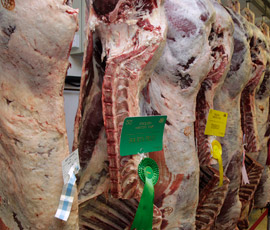EBLEX to use DNA tests after horsemeat scandal

The EBLEX Quality Standard Mark Scheme (QSM) for beef and lamb are looking at implementing random DNA testing in the wake of the horsemeat scandal.
The levy body for England has decided to look at a pilot project of random DNA testing to underpin the mark and as an additional fail-safe.
Although QSM has used DNA technology in the past to check products labelled as English and British actually were, they did not initially envisage using the technology to test for other meat products.
“We are not doing this because we expect to find other meats in QSM products or that we believe there is a risk, but we are doing it to underpin the mark – it’s just another check in place.”
EBLEX regional manager Phil Hadley
Speaking to Farmers Weekly, senior regional manager for EBLEX Phil Hadley said: “We are not doing this because we expect to find other meats in QSM products or that we believe there is a risk, but we are doing it to underpin the mark – it’s just another check in place.”
Dr Hadley said they will make sure the processors are aware random samples will be taking place and that any products could be subject to analysis.
The Food Standards Agency (FSA) has also initiated a sampling programme to investigate the authenticity of a range of meat products produced in the UK. Samples of meat have been taken from the Dalepak plant by North Yorkshire Trading Standards and will be tested for the presence and level of any horse or pig DNA.
The FSA is focussing particularly on Dalepak’s suppliers and whether it has suppliers in common with the Silvercrest processing plant in Ireland, one of the meat processing plants connected in the horsemeat scandal.
Read more on the horsemeat scandal
